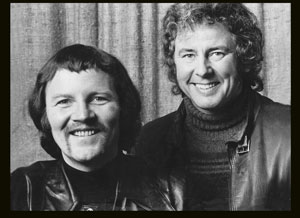 Robin Hall & Jimmie MacGregor were Scotland’s first folk stars and became household names throughout the UK, making Scottish songs including The Mingulay Boat Song, Coulter’s Candy and Ye Cannae Shove yer Granny aff the Bus, as well as a wider repertoire, popular with audiences at home and abroad.
Robin Hall & Jimmie MacGregor were Scotland’s first folk stars and became household names throughout the UK, making Scottish songs including The Mingulay Boat Song, Coulter’s Candy and Ye Cannae Shove yer Granny aff the Bus, as well as a wider repertoire, popular with audiences at home and abroad.
The partnership between Hall, an Edinburgh-born former actor, and MacGregor, a former art teacher and studio potter from Springburn in Glasgow, was formed in 1959 when, having made their ways separately to London and then, presently, on to a youth music festival in Vienna, they were sent on stage together. They may not have known each other previously but their voices blended well enough to attract praise from the legendary American singer and political activist Paul Robeson, who was appearing on the same concert.
Only too aware of the significance of Robeson’s patronage, MacGregor suggested that they should continue as a duo and pooling their resources and experience – MacGregor had sung with the Chas McDevitt Skiffle Group, the Steve Benbow Folk Four and The City Ramblers; Hall had already recorded a series of EPs and shared MacGregor’s passion for blues, skiffle, jazz and folk music – they launched themselves on the London folk scene.
Their big break came when their agent phoned BBC TV’s Tonight show and suggested that what this popular tea-time current affairs programme needed for Burns Night was a song by Scotland’s national bard – and he could provide two Scottish singers who were tailor-made for the job. It was a lie. Neither Hall nor MacGregor, despite their wide repertoires, knew a single Burns song. So they rehearsed Rantin’ Rovin’ Robin in the taxi on the way to the studio and on the strength of their performance on the programme that night they were given a week’s trial that led to a ten-year residency.
Having played to an average of fifty people in London’s folk cellars, the duo now found themselves with a regular nightly audience of more than nine million and drew on their wide knowledge of songs to address topical issues, to fill in gaps during technical hitches and to serenade visiting dignitaries including President Jomo Kenyatta of Kenya, whom they welcomed with an African freedom song.
Taken to the nation’s collective heart, the pair signed to Decca Records, scored a hit single in 1960 with Fitba’ Crazy and went on to record twenty albums as a duo and as part of the Galliards with Leon Rosselson and Shirley Bland. They also appeared at every major theatre and concert hall in the UK, with support on occasion from an up and coming band called The Beatles, appeared alongside blues legends Sonny Terry & Brownie McGhee and the then fresh-faced folk singers Bob Dylan and Paul Simon and made innumerable appearances on radio and television programmes including Hullabuloo and The White Heather Club.
Following their split in 1981 they both continued in broadcasting. Robin, who died in 1998, made programmes including The Sing Song Streets for Radio Clyde and Jimmie became Scotland’s spokesman for the great outdoors, fronting television programmes on the West Highland Way and hosting Radio Scotland’s popular MacGregor’s Gathering for ten years. Their contribution to the Scottish folk scene, as singers, ambassadors and a source of repertoire, however, remains immense.